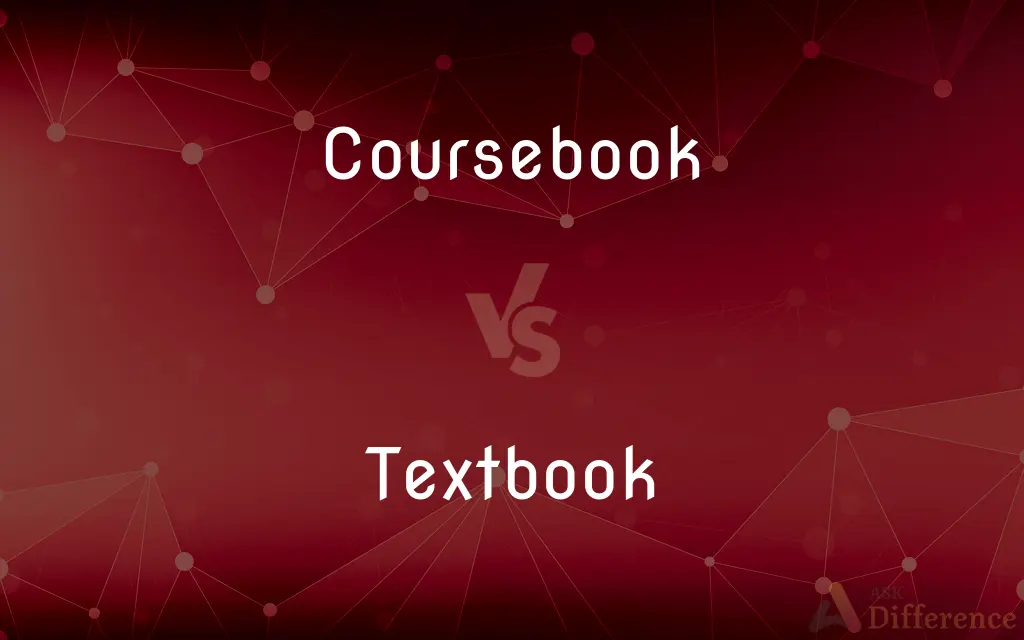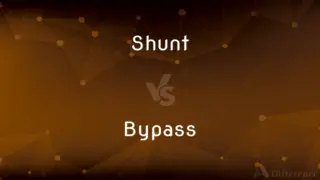Coursebook vs. Textbook — What's the Difference?
Edited by Tayyaba Rehman — By Fiza Rafique — Updated on October 30, 2023
A "coursebook" is designed for a specific educational course with exercises and lessons. A "textbook" provides comprehensive information on a particular subject, often without specific lessons.

Difference Between Coursebook and Textbook
Table of Contents
ADVERTISEMENT
Key Differences
A "coursebook" is a teaching resource tailored to a specific course or curriculum. It often incorporates lessons, activities, exercises, and assessments all in one, aiming to guide both the instructor and the student through the learning process. In contrast, a "textbook" is a more general educational resource that focuses on a particular subject or field of study, offering in-depth information, explanations, and discussions without necessarily being tied to a specific course or curriculum.
The primary function of a "coursebook" is to offer a structured and coherent progression through a topic, often with built-in milestones and evaluations. It might also have ancillary materials, such as workbooks, CDs, or online resources, designed to complement and reinforce the learning journey. On the other hand, a "textbook" serves as a reference material, providing extensive content on a subject, which can be consulted by students, researchers, or professionals.
While both "coursebooks" and "textbooks" are integral to the learning process, they cater to different educational needs. A "coursebook" is typically adopted by educational institutions for a particular class or course, ensuring that students and teachers have a unified roadmap for the term. In comparison, a "textbook" might be recommended for multiple courses or self-study, given its broader scope and focus on content rather than a learning sequence.
However, the boundaries between a "coursebook" and a "textbook" can sometimes blur. Some textbooks come with supplementary materials, exercises, and even online components, making them resemble coursebooks. Likewise, some coursebooks can be so comprehensive that they function similarly to textbooks. Still, the core distinction remains: "coursebooks" are course-specific, while "textbooks" are subject-specific.
Comparison Chart
Purpose
Designed for specific courses
Covers a subject broadly
ADVERTISEMENT
Content Structure
Lessons, activities, exercises, assessments
Detailed information, explanations, discussions
Usage
Followed for a particular course or curriculum
Used as a reference or for multiple courses
Scope
Course-specific
Subject-specific
Additional Materials
Often comes with supplementary resources
Might or might not have extra resources
Compare with Definitions
Coursebook
A guide used in academic courses with built-in assessments.
Students found the chemistry coursebook's experiments engaging.
Textbook
A comprehensive source on a particular field of study.
The philosophy textbook delves into various schools of thought.
Coursebook
A book tailored for a particular educational course.
The new Spanish coursebook has interactive exercises and dialogues.
Textbook
A book providing detailed information on a specific subject.
The biology textbook offers insights into cell structures and functions.
Coursebook
A resource offering a coherent progression through a topic.
The history coursebook spans ancient civilizations to modern times.
Textbook
A standard book recommended in academic settings.
The textbook on astronomy is used in universities nationwide.
Coursebook
A teaching tool containing structured lessons and activities.
The mathematics coursebook gradually introduces complex problems.
Textbook
A book serving as a foundational resource for a subject.
The psychology textbook is a must-read for budding therapists.
Coursebook
A learning material specific to a class or curriculum.
The literature coursebook included diverse authors and genres.
Textbook
An academic reference material.
The economics textbook covers both micro and macro perspectives.
Coursebook
A textbook, a book designed to accompany a specific academic course, or one specified by the writers of the course to be read by its students.
Textbook
A textbook is a book containing a comprehensive compilation of content in a branch of study with the intention of explaining it. Textbooks are produced to meet the needs of educators, usually at educational institutions.
Textbook
A book used in schools or colleges for the formal study of a subject.
Textbook
Being a characteristic example of its kind; classic
A textbook case of schizophrenia.
Textbook
A coursebook, a formal manual of instruction in a specific subject, especially one for use in schools or colleges.
Textbook
Of or pertaining to textbooks or their style, especially in being dry and pedagogical; textbooky, textbooklike.
Textbook
Having the typical characteristics of some class of phenomenon, so that it might be included as an example in a textbook.
Textbook
A book prepared for use in schools or colleges;
His economics textbook is in its tenth edition
The professor wrote the text that he assigned students to buy
Textbook
According to or characteristic of a casebook or textbook; typical;
A casebook schizophrenic
A textbook example
Common Curiosities
Is a textbook only for academic purposes?
Primarily, yes. But they can also be used by professionals or enthusiasts for reference.
Do coursebooks always have exercises?
While many do, it's not a strict rule. However, coursebooks often include activities or assessments.
Can one course have multiple coursebooks?
Yes, especially if the course covers diverse topics or is spread across multiple levels.
Is it common for coursebooks to come with online components?
Yes, many modern coursebooks offer online resources, such as videos, quizzes, or forums.
Are digital coursebooks popular?
Yes, digital coursebooks, often with interactive elements, are becoming increasingly common.
Why might an instructor not follow a textbook strictly?
Instructors might adapt based on the class's pace, needs, or other supplementary materials.
Are all coursebooks also textbooks?
Not necessarily. While some coursebooks function as textbooks, they are primarily designed for specific courses.
Why are some textbooks accompanied by workbooks?
To provide additional exercises and practice, making the learning more interactive.
Can one subject have multiple textbooks?
Absolutely. A subject can have numerous textbooks, each with a different focus or perspective.
Are textbooks always expensive?
While many are, there are also affordable editions, used books, or open-source versions available.
Do coursebooks get updated frequently?
Yes, especially if the subject matter or curriculum changes or to incorporate new teaching methods.
Can a textbook be used in multiple courses?
Yes, textbooks, given their broad scope, can be recommended for various courses or self-study.
What's an "international edition" of a textbook?
It's an edition tailored for markets outside the publisher's home country, sometimes at a lower price.
Can a coursebook be used for self-study?
While designed for courses, many learners use coursebooks for self-paced study due to their structured approach.
Is the content depth the same in textbooks and coursebooks?
Textbooks typically delve deeper into subjects, while coursebooks might prioritize a structured learning journey.
Share Your Discovery

Previous Comparison
Modulation vs. Demodulation
Next Comparison
Shunt vs. BypassAuthor Spotlight
Written by
Fiza RafiqueFiza Rafique is a skilled content writer at AskDifference.com, where she meticulously refines and enhances written pieces. Drawing from her vast editorial expertise, Fiza ensures clarity, accuracy, and precision in every article. Passionate about language, she continually seeks to elevate the quality of content for readers worldwide.
Edited by
Tayyaba RehmanTayyaba Rehman is a distinguished writer, currently serving as a primary contributor to askdifference.com. As a researcher in semantics and etymology, Tayyaba's passion for the complexity of languages and their distinctions has found a perfect home on the platform. Tayyaba delves into the intricacies of language, distinguishing between commonly confused words and phrases, thereby providing clarity for readers worldwide.
















































